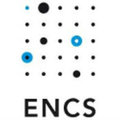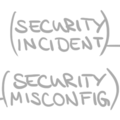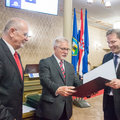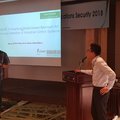News
03 September 2018
ENCS Welcomes Students To Energy Cyber Security Week

What does the energy transition mean for cyber security? What effect on security will widespread electric vehicles have? Do you have what it takes to defend a SCADA system from attack?
21 August 2018
A Slam for Cybersecurity@TU Delft

This year has been the most successful year for TU Delft’s Cybersecurity group so far, and marks the first year in which the group was able to place a paper in every single one of the Big Four.
20 August 2018
Simple human errors often cause cyber security breaches

A company leaking private data of millions of customers, or becoming a victim of cyber-attacks costing hundreds of thousands to millions of Euros has become an almost daily occurrence, in what seems to be highly sophisticated attacks. “When investigating these attacks more closely however, they are actually often not sophisticated, and neither are the vulnerabilities that lead to them,” says Tobias Fiebig, assistant professor at TPM and leading researcher.
17 August 2018
First large-scale market analysis of underground cybercrime economy

Cybercrime is easier to carry out as more and more online criminal services (commodities) become available. TU Delft researcher Rolf van Wegberg investigated the extent and growth of this specific online underground economy.
18 June 2018
35th Annual Assembly of the Croatian Academy of Engineering

On May 21 in Zagreb, the 35th Annual General Assembly of the Croatian Academy of Engineering (HATZ) was held.
13 June 2018
Paper presentation at ASIACCS 2018 marks the first success of TU Delft and SUTD collaboration on Cyber Security

07 June 2018
TU Delft helps develop digital ID for use on your phone

In addition to your passport and driving licence, a phone application that enables you to prove your identity quickly and securely and also offers even more privacy options could soon be possible. As part of the Dutch Blockchain Coalition, Delft University of Technology (TU Delft, The Netherlands) has joined forces with the Netherlands Identity Data Agency (RvIG), a division of the Ministry of Foreign Affairs and Kingdom Relations (BZK), IDEMIA (the current manufacturer of Dutch passports) and law firm CMS, in developing an initial prototype for a digital stamp that could fulfil this purpose in the future. This digital identity is based on TU Delft’s innovative blockchain technology, known as Trustchain. The prototype was demonstrated at a BZK event held on 7 June. After the summer, a consumer trial of this technology will be launched in two Dutch municipalities.
15 May 2018
Lecture on the basics of Machine Learning for the School of Architecture of NXP’s Business Unit Security & Connectivity
On April 10, Stjepan Picek gave a lecture on the basics of Machine Learning for the School of Architecture of NXP’s Business Unit Security & Connectivity. In his lecture he discussed artificial intelligence and machine learning and more in-depth about applications to security domain. The audience were senior technical engineers from almost all parts of the world with in total 27 participants from US, India, China, Brazil, Austria, Romania, France, The Netherlands and Germany.
11 April 2018
Samaneh Tajalizadehkhoob shortlisted for Dutch Cyber Security Research best Paper Award competition 2018
The paper of Samaneh Tajalizadehkhoob et al. titled ‘Herding Vulnerable Cats: A Statistical Approach to Disentangle Joint Responsibility for Web Security in Shared Hosting’ was shortlisted for Dutch Cyber Security Research best Paper Award competition 2018.
04 April 2018